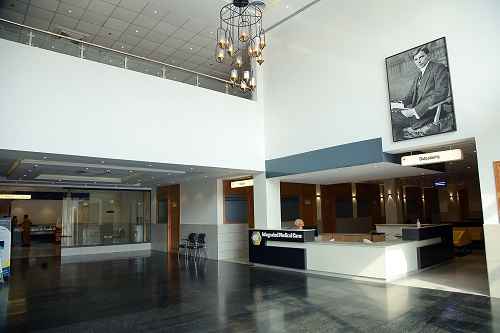- 14-May-25
Spinal surgery is a medical operation used to treat issues with the spine, including nerve compression, herniated discs, chronic back pain, and spinal abnormalities. The goals of spinal surgery are to lessen pain, improve mobility, and restore function by treating the underlying issue affecting the spine. This could entail releasing pressure on spinal nerves, stabilizing the spine through fusion, or removing a damaged disc. Surgery can be performed using less intrusive techniques or more conventional open approaches, depending on the problem. Physical therapy is frequently required to restore strength and mobility, and recovery times vary.
Types of Spinal Surgery:
There are several types of spinal surgery, each designed to treat specific spinal problems. Some of the most common types include:
- Discectomy: This surgery involves removing a part of a herniated or damaged disc that is pressing on a nerve root or the spinal cord, helping to relieve pain, numbness, or weakness.
- Laminectomy: This surgery, which is frequently performed to treat spinal stenosis, involves the surgeon removing the lamina, a part of the vertebra, to relieve pressure on the spinal cord or nerves.
- Spinal Fusion: To stop movement between two or more vertebrae, this operation joins them together. It is frequently used to treat ailments, including severe degeneration or spinal instability.
- Artificial Disc Replacement: To preserve movement and lessen pain, a damaged spinal disc is removed and replaced with an artificial one during this surgery.
- Foraminotomy: Nerve compression is relieved by this technique, which widens the aperture where the spinal nerve leaves the spinal canal.
- Corpectomy: In cases of severe damage or tumours, part of the vertebral body and adjacent discs are removed to decompress the spinal cord.
Each type of spinal surgery is chosen based on the patient’s specific condition, symptoms, and overall health.
Benefits of Spinal Surgery:
Spinal surgery can offer several important benefits, especially for individuals who have not found relief through non-surgical treatments like physical therapy or medication. One of the main benefits is pain relief, particularly for those suffering from chronic back or neck pain caused by conditions such as herniated discs, spinal stenosis, or nerve compression. Additionally, surgery can aid in the restoration of function and mobility, enabling patients to resume their regular daily activities and enhance their quality of life.
Another benefit is nerve decompression, which can relieve symptoms like numbness, tingling, or weakness in the arms or legs. In cases of spinal instability or deformity, such as scoliosis, surgery can stabilize or straighten the spine, preventing further damage. For patients with spinal injuries or tumours, surgery may also help prevent paralysis or other serious complications.
While recovery takes time, many patients experience long-term improvements in comfort, posture, and mobility. When done for the right reasons and with proper care, spinal surgery can be a life-changing procedure.
Keyhole Endoscopic Spine Surgery:
Keyhole Endoscopic Spine Surgery is a modern, minimally invasive procedure used to treat various spinal conditions such as herniated discs, spinal stenosis, and sciatica. This technique involves making a small incision through which a thin tube with a camera, called an endoscope, is inserted to access the spine. The high-definition visuals provided by the endoscope allow the surgeon to perform precise operations while minimising damage to surrounding tissues. Compared to traditional open spine surgery, this approach offers several benefits, including less pain, reduced blood loss, shorter hospital stays, faster recovery, and minimal scarring. Many patients are able to resume their regular activities far sooner as a result. Although every surgery carries some risk, Keyhole Endoscopic Spine Surgery is considered safe and effective, with a lower risk of complications.
Minimally invasive percutaneous fixation for spine fracture:
Minimally invasive percutaneous fixation for spine fractures is an advanced surgical technique used to stabilize fractured vertebrae with minimal disruption to surrounding tissues. Instead of making large incisions, the surgeon uses small skin punctures to insert screws and rods through the skin (percutaneously) under imaging guidance, such as fluoroscopy or CT scans. This method is commonly used for traumatic spine fractures, particularly in the thoracic and lumbar regions. The key advantages of this technique include reduced blood loss, shorter surgery time, less postoperative pain, faster recovery, and a lower risk of infection. Compared to typical open spine surgery, patients frequently have shorter hospital stays and faster rehabilitation since the muscles and soft tissues are preserved. This procedure is especially beneficial for elderly or high-risk patients who may not tolerate more invasive approaches
Integrated Medical Care Hospital (IMC Hospital):
Integrated Medical Care Hospital (IMC Hospital), in partnership with DHA Lahore, revolutionizes neurological care with advanced techniques, expert surgeons, and a digital healthcare platform for seamless treatment. From minimally invasive procedures to complex surgeries, we ensure precision and patient-focused care. Schedule a consultation today!
Dr. Ammar Anwer
MBBS, MS (Neurosurgery), CHPE, CCE
Specialties: Neurospine Surgery
Areas Of Focus: Brain & Spine Surgery

 Map
Map


.png)







